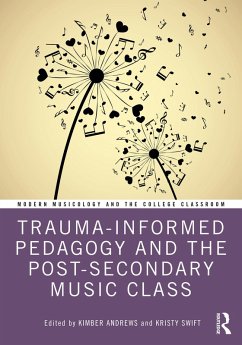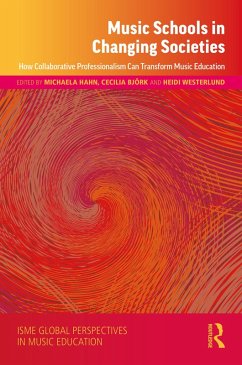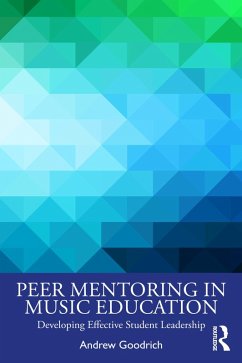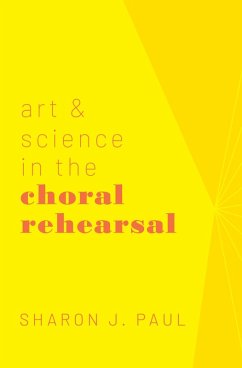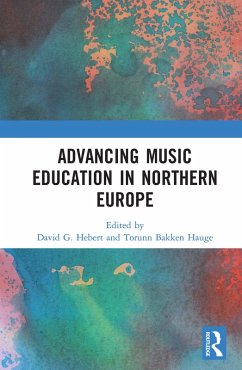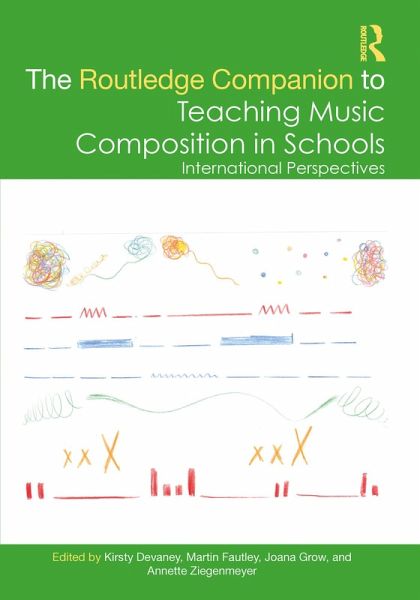
The Routledge Companion to Teaching Music Composition in Schools (eBook, PDF)
International Perspectives
Redaktion: Devaney, Kirsty; Ziegenmeyer, Annette; Grow, Joana; Fautley, Martin
Versandkostenfrei!
Sofort per Download lieferbar
47,95 €
inkl. MwSt.
Weitere Ausgaben:

PAYBACK Punkte
24 °P sammeln!
The Routledge Companion to Teaching Music Composition in Schools: International Perspectives offers a comprehensive overview of teaching composing from a wide range of countries around the world. Addressing the current state of composition pedagogy from primary to secondary school levels and beyond, the volume explores issues, including different curricular and extracurricular settings, cultural aspects of composing, aesthetics, musical creativity, the role of technology, and assessment.With contributors from over 30 countries, this volume encompasses theoretical, historical, empirical, and pr...
The Routledge Companion to Teaching Music Composition in Schools: International Perspectives offers a comprehensive overview of teaching composing from a wide range of countries around the world. Addressing the current state of composition pedagogy from primary to secondary school levels and beyond, the volume explores issues, including different curricular and extracurricular settings, cultural aspects of composing, aesthetics, musical creativity, the role of technology, and assessment.
With contributors from over 30 countries, this volume encompasses theoretical, historical, empirical, and practical approaches and enables comparisons across different countries and regions. Chapters by experienced educators, composers, and researchers describe in depth the practices taking place in different international locations. Interspersed with these chapters, interludes by the volume editors contextualize and problematize the teaching and learning of composing music. The volume covers a range of contexts, including formal and informal, those where a national curriculum is mandated or where composing is a matter of choice, and a range of types, styles, and genres of musical learning and music-making.
Providing a wide-ranging and detailed review of international approaches to incorporating music composition in teaching and learning, this volume will be a useful resource for teachers, music education researchers, graduate and undergraduate students, and all those working with children and young people in composing music.
With contributors from over 30 countries, this volume encompasses theoretical, historical, empirical, and practical approaches and enables comparisons across different countries and regions. Chapters by experienced educators, composers, and researchers describe in depth the practices taking place in different international locations. Interspersed with these chapters, interludes by the volume editors contextualize and problematize the teaching and learning of composing music. The volume covers a range of contexts, including formal and informal, those where a national curriculum is mandated or where composing is a matter of choice, and a range of types, styles, and genres of musical learning and music-making.
Providing a wide-ranging and detailed review of international approaches to incorporating music composition in teaching and learning, this volume will be a useful resource for teachers, music education researchers, graduate and undergraduate students, and all those working with children and young people in composing music.
Dieser Download kann aus rechtlichen Gründen nur mit Rechnungsadresse in A, B, BG, CY, CZ, D, DK, EW, E, FIN, F, GR, HR, H, IRL, I, LT, L, LR, M, NL, PL, P, R, S, SLO, SK ausgeliefert werden.





